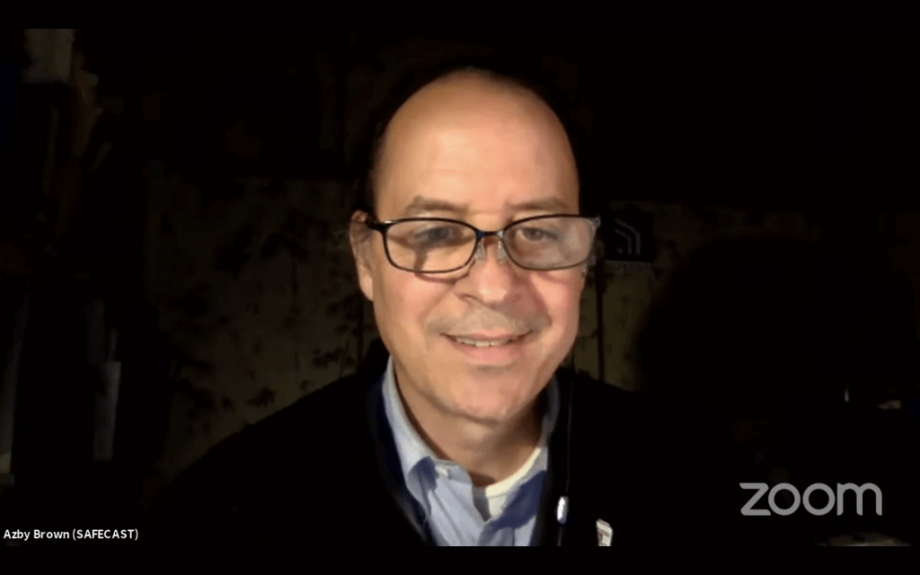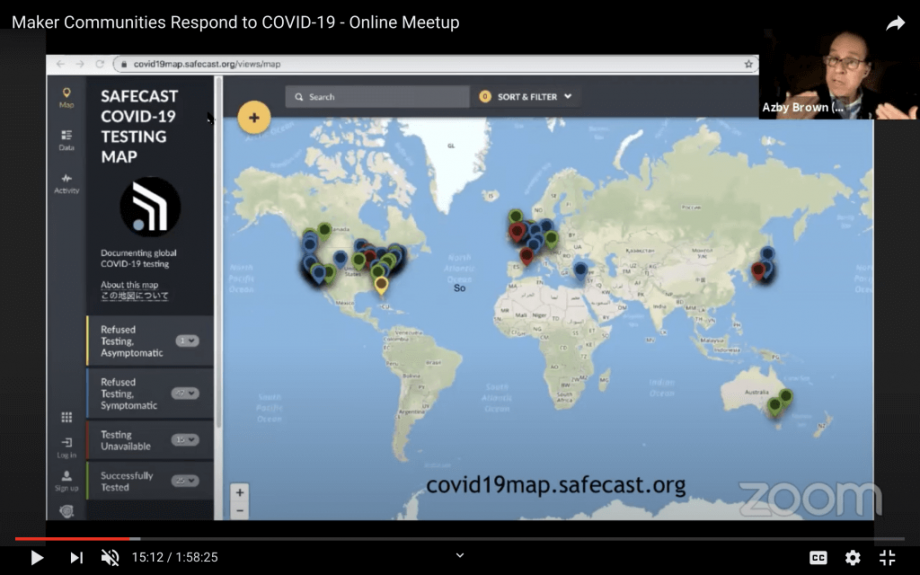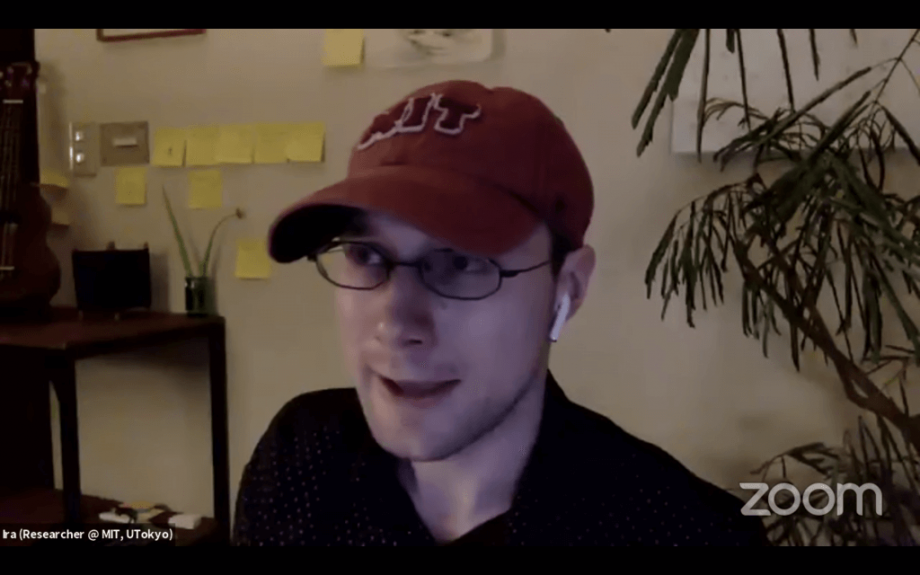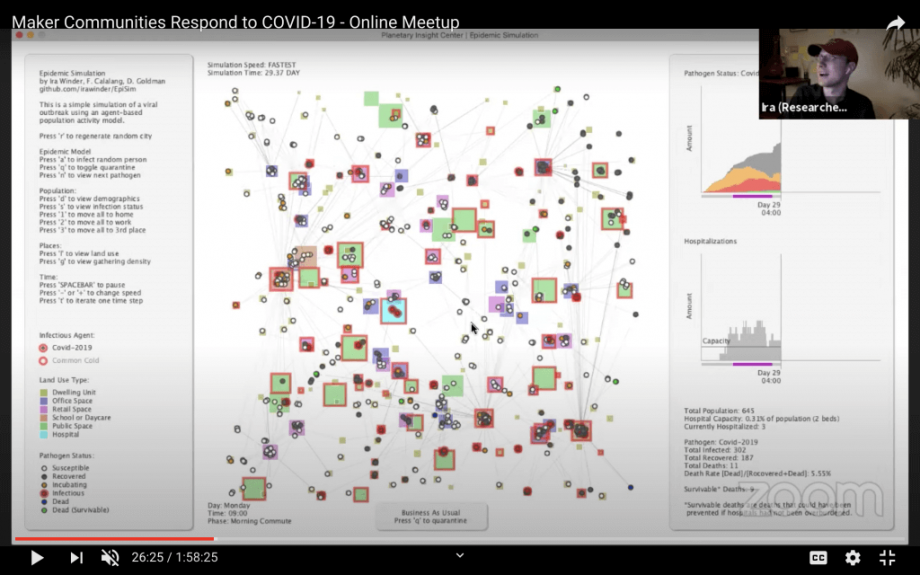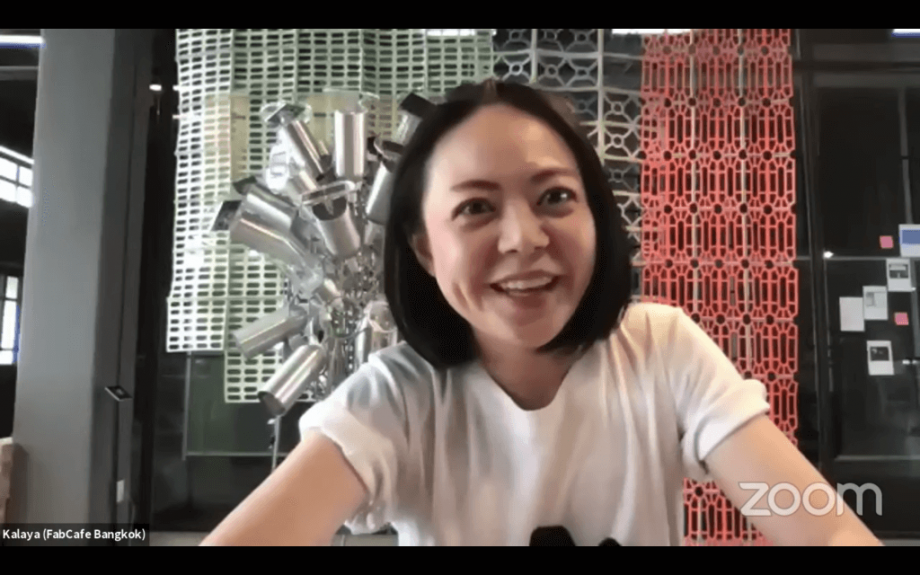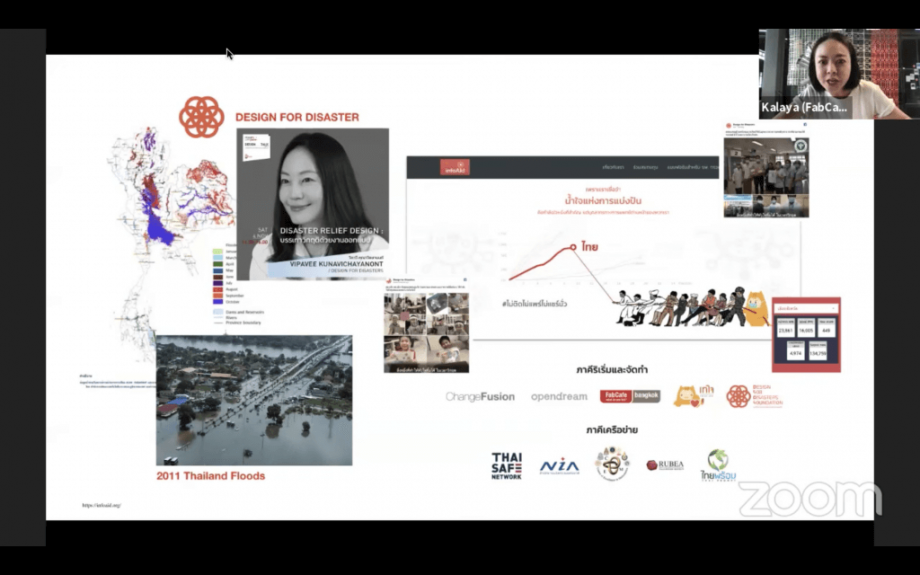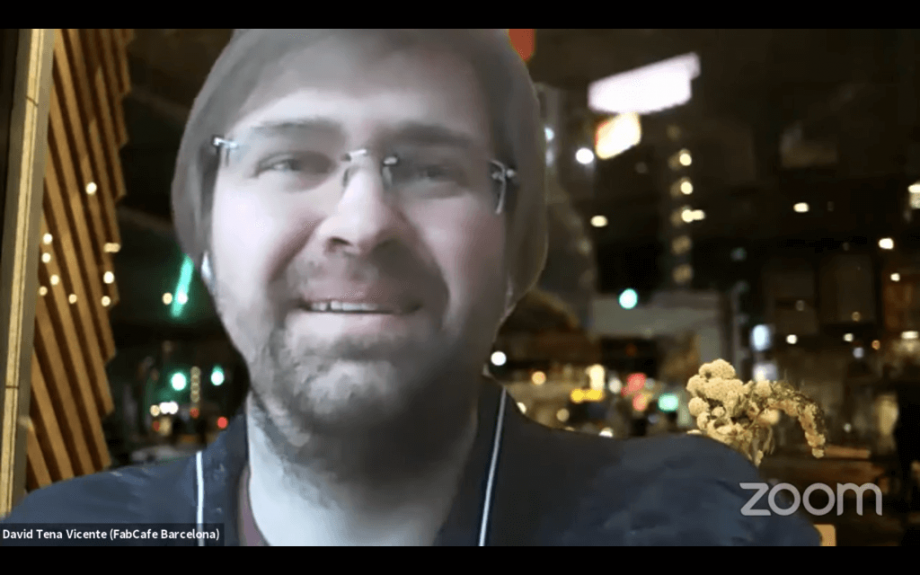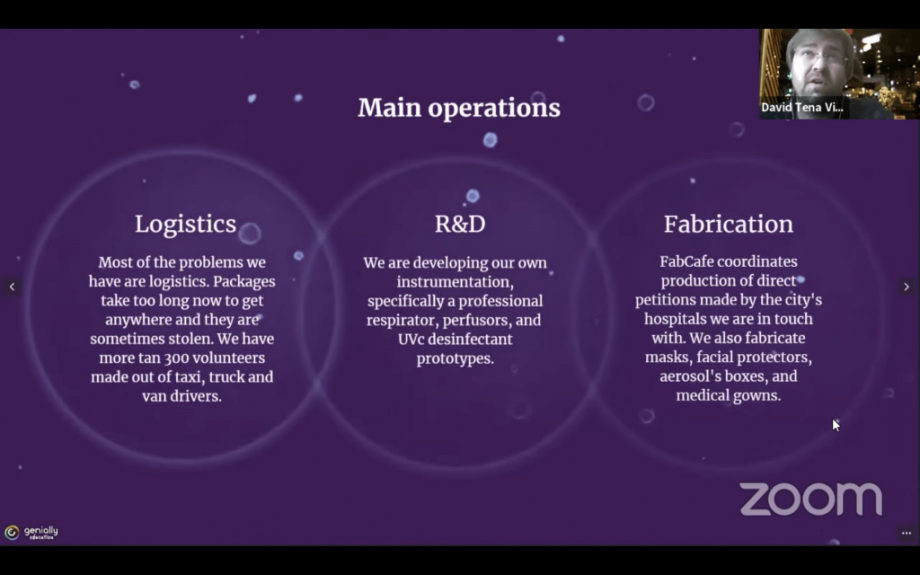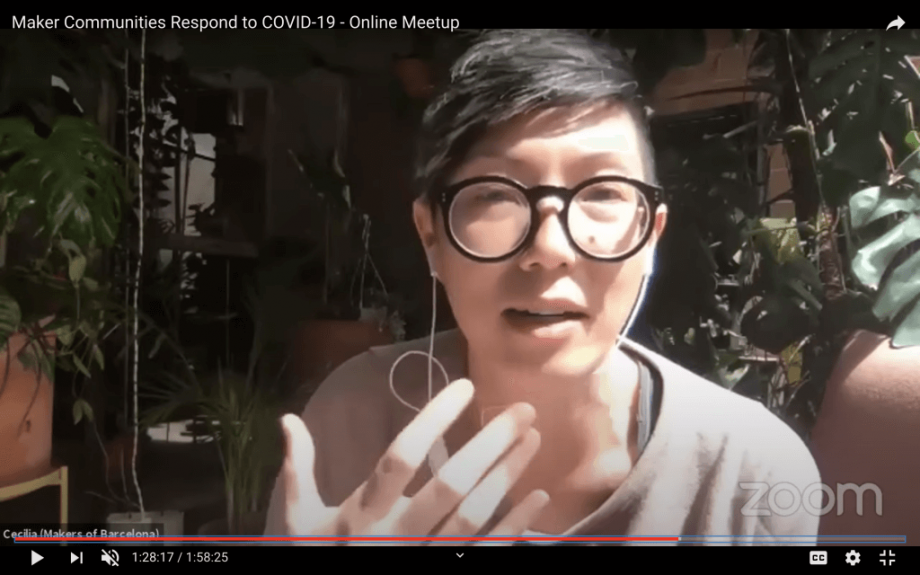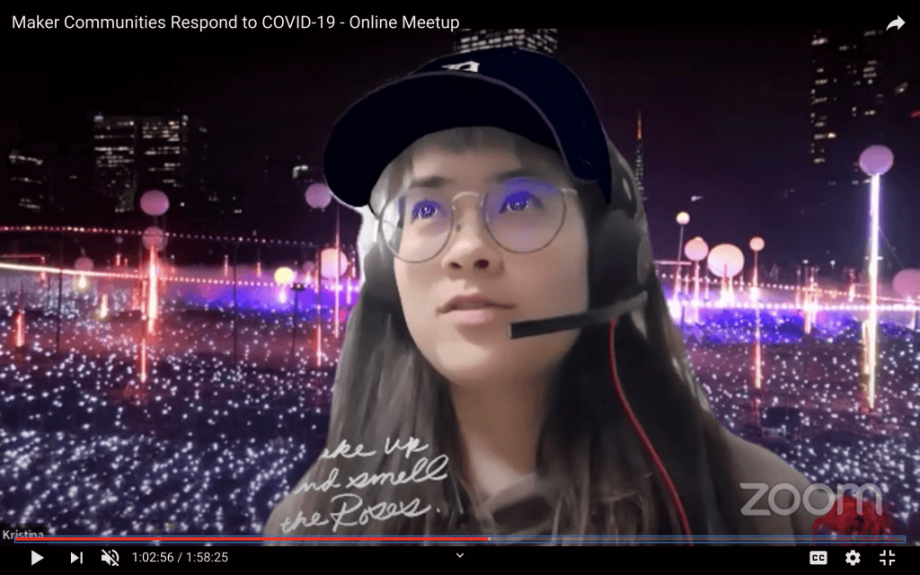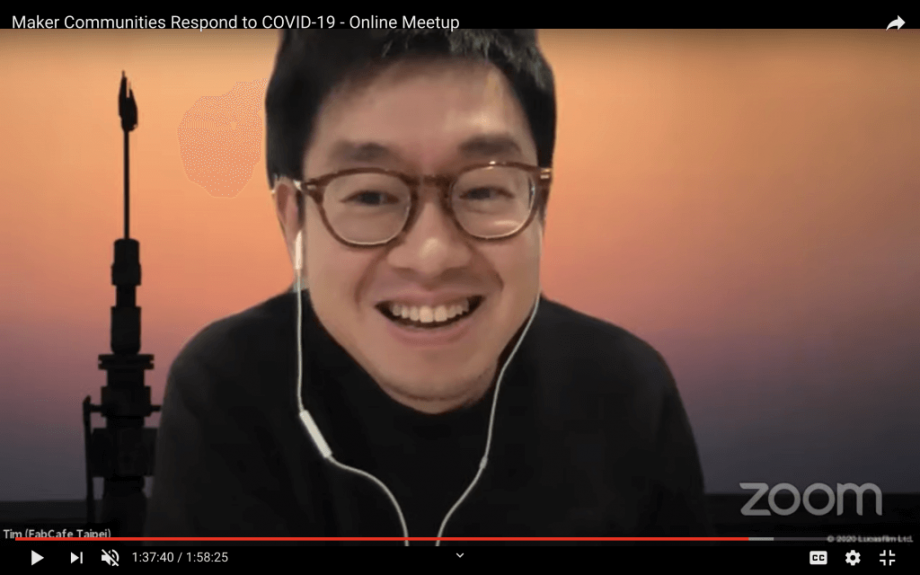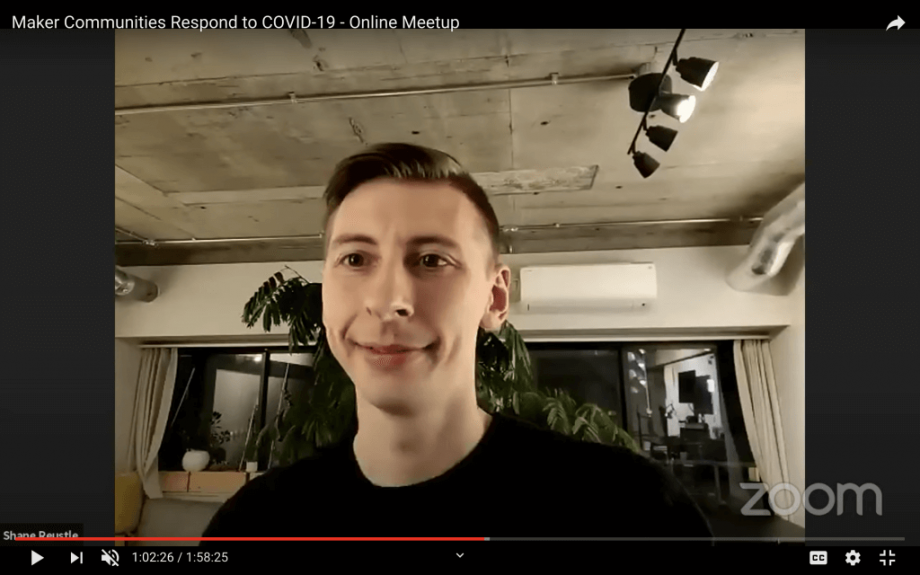Event report
May 14, 2020
FabCafe Taipei Editorial Team
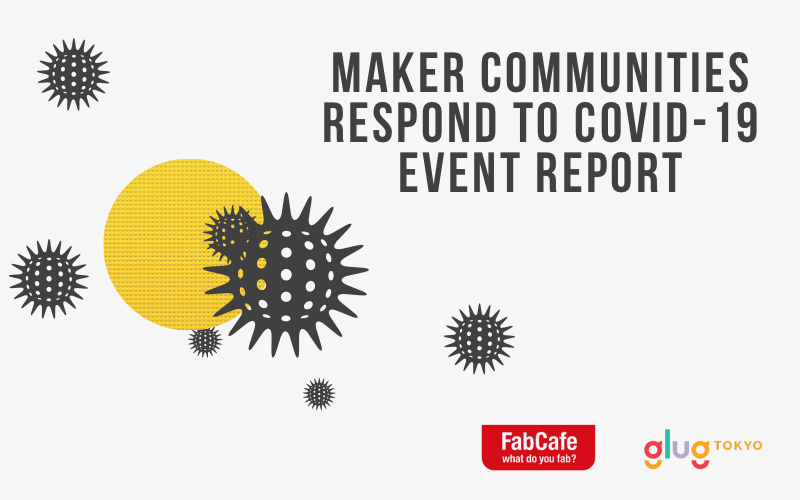
As the world continues to fight the rapid spread of COVID-19, confining many people to their homes and radically altering the way we think about healthcare and medical systems, maker communities around the world have been quickly responding to the crisis with the mission to save lives together.
This online meetup was organized on 24th April, 2020, in the middle of crisis, and invited maker community leaders based in Tokyo, Bangkok, Barcelona, and more to share their experiences and discuss the current and future role of maker communities. This event report summarizes some of the discussion’s key insights.

The co-hosts of the meetup, Kelsie Stewart from FabCafe and writer John Amari from event production company Glug Tokyo, briefly explained how teams of makers and stakeholders with various backgrounds are swiftly gathering to form bottom-up, collaborative projects to fight against COVID-19.
“FabCafe leaders and other maker space community members are responding agilely by connecting important players with pre-existing networks,” says Kelsie.
FabCafe, an open space with digital fabrication and a global network of 11 locations, organizes community workshops, classes and meetups. FabCafe’s theme of “What do you Fab?” became an even more salient question to ask in a time of crisis. Kelsie introduced their most recent project, Mask Design Challenge, where they invite creators to submit their ideas for face masks of the future. Their innovative game design challenge was also launched to seek the potential of gamification to learn offline in the time of COVID-19.
That said, the purpose of this gathering was to share the knowledge and experiences of local maker community leaders who are creating solutions that require quick prototyping and collaboration at the local level, the hosts explained.

Four featured guest speakers + 4 cross talk members + 2 co-hosts
Guest talks: Quick prototyping and collaboration
In the first part of the meetup, four guest speakers—Azby Brown (Safecast), Ira Winder (Procedural Pandemic), Kalaya Kovidvisith (FabCafe Bangkok Co-founder), and David Tena Vicente (FabCafe Barcelona CEO)—were invited. Each guest had about 5 minutes to speak about their works in response to COVID-19.
COVID-19 testing map – Azby Brown (Safecast)
The first presenter was Azby Brown, who is an expert on Japanese design, craftsmanship, and environmental sensibility and a Lead Researcher for Safecast, a global citizen network for collecting and sharing environmental monitoring data, such as radiation and air quality measurements.
“We launched Safecast in March 2011 after the Fukushima disaster — in response to the lack of trustworthy information.” Azby explained the background of Safecast, “We created our own measurement system with GPS and data-logging radiation sensors we designed, and an online database. We made the data entirely open to public transparency and trust have been always the key to our project.”
Safecast’s focus has always been on people and their communities as it grew into a global network with the help of volunteers. “People need answers,” he says. “People should have access to reliable and accurate information in order to make decisions about their own safety and that of their friends and families.” This is why, in response to the recent crisis, they have newly launched the COVID-19 Testing Map.
The COVID-19 Testing Map is a crowdsourced map to show availability of testing and help people share their experiences and stories when seeking COVID-19 testing. In the time of crisis, either Fukushima or COVID-19, when it’s confusing what information is trustworthy or not, “it’s important to make people feel included,” he explains. “It’s important to help people feel engaged and find ways for them to participate, to help them deal personally with crises.”
Building an epidemic simulation – Ira Winder (Massachusetts Institute of Technology)
The next speaker was Ira Winder , a researcher, educator, and practitioner who specializes in end-to-end design, development, and implementation of interactive simulations. He shared his recent simulation project which shows how the virus and social distancing can impact our society.
“The principle of building a simulation is to learn,” Ira explains. In the early stages of the virus’ spread, with social distancing being discussed as a means to protect us, he became curious about how social distancing can impact the spread and prevention of the virus over time.
His simulation shows demography and space types in a simple, hypothetical city; in this model, one can make people move, go to schools, shop, or stay home. When someone is sick, the model can visualize how the virus can spread over time in different scenarios. One can also simulate the effect of a quarantine, which can slow exponential growth of new cases. From here, one can start imagining different interventions we might want to try and how much impact each measure might have. Through the simulation, he learned that it might be dangerous to stop the quarantine prematurely, even when things seem to be getting better.
The EpiSim project is open-source, and you can download and run the simulation on your own machine.
Kalaya Kovidvisith (FabCafe Bangkok)
Kalaya is the co-founder of FabCafe Bangkok since 2014, and in her presentation she focused on the theme of community-driven innovation. “Collaboration has been an essential element in connecting the backlines with the frontlines to fight against COVID-19 in Bangkok”, she explains.
She divided the crisis in Thailand into four phases: pre-travel restriction, travel restriction, after Lumpini boxing stadium (which is an event when a sharp increase of confirmed cases appeared in Thailand), and curfew. She then explains how community-driven innovation involving different disciplines emerged in each phrase.
In Bangkok, startup makers who initially worked in healthcare started incubating projects with some medical teams in Thailand in the early stages even before travel restrictions were in place. Various projects emerged, ranging from a personal health record log book, to a chatbot, to DIY-mask making workshops, to tools for daily medical operations.
In the time of crisis, aligning with various stakeholders and successfully relocating resources such as donations on time is crucial. FabCafe Bangkok and TCDC (Thailand Creative & Design Center), with its strong connections to corporate suppliers and distributors, have been managed to develop and deliver what’s needed to the hospitals
“The most important thing is to put hospitals as our leaders,” Kalaya concluded. “We have to listen to their needs, and together, we need to do what we can, with what we have, at where we are.”
For more information on FabCafe Bangkok’s recent COVID-19 project, see Hacking for Covid-19 with Collaboration and Fabrication: Five FabCafe Bangkok Projects
David Tena Vicente (FabCafe Barcelona)
The final speaker was David, the CEO of FabCafe Barcelona. With his strong pre-pandemic connections to key local stakeholders, he has become a logistics leader.
The local maker communities in Barcelona responded quickly; in the first few days FabCafe Barcelona started to prototype and joined an 800-person strong Covid-makers chat group. From here, their projects focuses on three categories based on local immediate needs — logistics, R&D, and fabrication — and started taking requests directly from the hospitals.
“We have already worked with hospitals in the past, so we already had contacts. In the time of crisis, existing networks with other stakeholders such as companies become effective, which helps us to have a bigger picture of what we can do,” David says.
As far as fabrication, they have developed and deployed personal protection equipment, including over 22,000 masks, 11,000 medical gowns and 553 face shields, splitters for testing in hospitals, a prototype of an aerosol box and other medical equipment. For keeping patients in touch with their family members, FabCafe worked with an existing partner to donate 400 tablets equipped with sim cards. Their co-working space has been used as a logistics center, supplying essential goods for patients including 10,080 liters of water. The hospital also asked them to develop an engine respirator as well as a perfusor.
While in the beginning, many of the projects were self-funded, David soon moved to crowdfunding and finally received much needed materials by working directly with manufacturers. We learned from David’s presentation that a “network of trust” — access to reliable information, people, organizations, material producers, and more — as well as a “macrovision of what is going on” is essential in the time of crisis.

Cross talk: Thinking of the future of makers’ communities
Following the four talks by guest speakers, there was a crosstalk with several other guests. Shane Reustle (Reustle Inc/Tokyo Tech meetup), Tim Wong (Founder of FabCafe Taipei and HK), Kristina Yasuda (Microsoft, InternetBar.org), Cecilia Tham (Senior Social Technologist × Futures Synthesist/Board of Advisor City of Barcelona) joined the discussion.
Transparency and privacy
The first keywords that were raised during the crosstalk discussion were transparency and trust. To a question about the response to their COVID-19 map, Safecast’s Azby pointed out the social need for information, “People need to know what they need to know.”
In the time of crisis, when it’s difficult to decipher what can be considered a trustworthy source of data so providing good data in an easily accessible form is crucial. Crosstalk member Shane Reustle developed a COVID-19 tracker by processing information from the Japanese government, in response to a lack of clear information about patient data.
Kristina, a director of Digital Identities at InternetBar.org, spoke about contact tracing which focuses on privacy preservation. A problematic part of Japanese society regarding privacy is that the portion of the population who are willing to provide personal information around COVID-19 in Japan is only around 35%, compared to an average of 75% globally. To address this issue, they developed an app that gives users an anonymous identifier.
On top of this, sometimes getting the data to begin with can be challenging on a cultural level. In Japan, people don’t seem to want to share their test results, Azby pointed out. He says there is an issue of stigmatization, which was apparent in Japan after Fukushima. People in Japan don’t want others to know whether they were tested, and nobody wants to be the first to bring disease into a group. They don’t want to share information, even if it’s anonymous.

Collaboration
While there are many initiatives popping up, there is also an issue of how to coordinate these projects. When it comes to a crisis, how can we best coordinate to get the most effective results quickly?
Shane took a stand for increased online collaboration, saying that open-source projects can provide data sets that could reduce potential duplication of efforts among bottom-up projects. Collaboration can be tricky, but compared to physical and logistical projects, information gathering and distribution ought to be comparatively easy to coordinate.
Cecilia pushed this point to the offline world: “There were so many projects from maker communities, but not enough collaboration in place to make it more efficient. Hopefully in the future, other entities like hospitals and governments would realize the value of the maker community in the future so that we can produce things in the time of crisis.”
When it comes to collaboration, it’s important to apply knowledge and transfer the lessons we learned to vulnerable populations and low-tech environments. “Many vulnerable populations in need of gears don’t necessarily have machinery or tools to make them,” Cecilia noted. She emphasized that we could contribute even in low-tech, limited supplied areas with locally resourced materials with a series of ‘how to’ instructions.
Future of makers communities
As a concluding remark, the question was raised about how the crisis is going to change the maker community in the future, including the successful projects that potentially have lasting impact and may continue to be used and deployed even after COVID-19.
“Maker communities have great adaptability — and professionals in the community, with updated technology, tend to have broader views so that we can help others,” said David.
Tim emphasized the importance of the FabCafe global network, which has been active more than ever during the crisis. Even though we are living in isolation, the geographical distance disappears when we are faced with the same time-sensitive challenge. Shane agreed: “It’s rare to be hit like this globally. Everyone can join globally, and trackers are open source. I’m glad to see the expansion of collaboration.”

Conclusion
A common thread that stands out among the makers is their style of “Resilience” in face of crisis. In response to COVID-19, without skipping a beat, makers and researchers have responded to the situation with a sense of urgency, continuously asking themselves, “What can we do? What can we make? What connections do we have? And how can we share it?” Communities have been actively answering these questions through action with their own resources and capabilities, and we learned of some of those inspiring projects at this event.
FabCafe’s global maker community will continue fighting, and there are some exciting new projects coming up online in which you can participate. How to make it safe is an online workshop series bringing the spirit of fab and medical exports together to create medical devices. FabCafe Hong Kong is organizing an online FAB Meetup called “Immersive Distant Learning with XR (VR/AR/MR)”, and MTRL Kyoto has brought their monthly material meetup online.
Together, the maker community keeps contributing a combination of solutions to address the world-scale problems we face.
-
FabCafe Taipei Editorial Team
This articles is edited by FabCafe Taipei.
Please feel free to share your thoughts and opinions on this article with us.
→ Contact usThis articles is edited by FabCafe Taipei.
Please feel free to share your thoughts and opinions on this article with us.
→ Contact us

